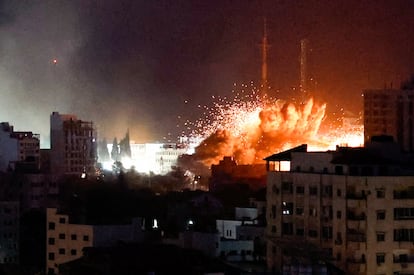Israel-Hamas: An explosive front in a world sinking into global disorder
The conflict threatens wider consequences such as the cooling of the Israeli-Saudi dialogue, new tensions between the West and Iran, and accusations of double standards leveled at Israel’s supporters

The new flare-up of violence ignited by the unacceptable, barbaric Hamas attack against Israel in the context of Israel’s illegal and oppressive occupation of Palestine has, of course, local roots. But an accurate interpretation of its genesis, objectives, and consequences requires applying not just a local or regional rationale, but a global view. The action and inaction of other parties — both near and far — are key. So is the context of a world in which, violently or otherwise, many countries are trying to change the global order, in which new alliances and changes in relations are taking shape, and in which major events monopolize attention and cause other issues to be neglected.
But it is not only the context that will influence the conflict; the same will also be true in reverse. Hamas’ unprecedented offensive will have an impact on an agitated global scenario where wars break out — in Ukraine or Azerbaijan — tensions proliferate between the two superpowers, the United States and China, and in the Sahel, where a series of coups d’état have been staged. In all likelihood, the impact will be severe.
Genesis
Of the many external factors influencing the outbreak of violence, two should be highlighted, of very different natures. The first is the factual support provided by Iran to Hamas, which considered a terrorist organization by the EU and the United States, among others. It remains to be clarified whether Tehran assisted in the planning of the attack, but its material support is certainly essential. It should be remembered that Iran is closely aligned with Russia and China, and that the latter exerts influence over the former due to its economic importance for a country without access to Western markets.
On a different level, there is little doubt that international neglect of the Palestinian question, the little or no pressure placed on successive Netanyahu governments — and not only in terms of reversing their occupation policies and negotiating with the Palestinians — have facilitated a ticking time bomb that has now exploded in a radically reprehensible manner.
Purposes
There is also no doubt that the main purposes of the Hamas attack have a global dimension: the generic one of drawing attention to a situation of oppression with no prospect of improvement after half a century of occupation, and the specific one of destroying the process of rapprochement between Israel and Arab countries, sponsored first by the Trump administration (with the United Arab Emirates and Morocco) and now by the Biden government (with Saudi Arabia). This is the fundamental key.
Consequences
The primary consequences are, of course, those affecting the civilian victims of the conflict. Hamas’ attack warrants unqualified condemnation. Israel has the right to defend itself, but it must do so with restraint, respecting international law. The Defense Minister’s announcement of a siege aimed at cutting off water, food, and electricity to Gaza’s citizenry is unacceptable collective punishment. It remains to be seen whether the conflict will escalate into an open confrontation between Israel and Hezbollah.
The geopolitical consequences are also going to be very relevant, albeit in the background. The conflict could prove disastrous on an already agitated global chessboard, creating a new fracture that generates oppositions and animosities.
In the face of the conflict, there are three blocs. One is led by the West and India — whose Prime Minister Narendra Modi is developing a Hindu nationalist policy that marginalizes Muslims — deployed in closed defense of Israel. Another, which includes China, Russia, and most of the countries of the Global South, merely calls for a cessation of hostilities and denounces the West’s hypocrisy in acquiescing to the Israeli occupation. In this bloc are the governments of some Arab or non-Arab Muslim countries, which face the problem of a popular sentiment very favorable to the Palestinians, as shown by the chants in some sports stadiums. A third bloc, led by Iran, support the Palestinian cause.
This specific conflict-related configuration will undoubtedly have an impact on the fluid state of international relations. We are living through a period of profound change marked by the contestation of the world order by powers such as China, India, and Russia. In this reconfiguration, the various players in the multipolar framework are seeking to consolidate their positions through new relationships.
The spiral of violence unleashed by Hamas will complicate, from the outset, the development of maneuvers for the normalization of relations between Arab countries and Israel. It also deals a severe blow to those who were pursuing efforts to channel relations between the West and Iran, and to guarantee renewed international control over Tehran’s nuclear program. And, of course, it will partially distract the United States from its strategic priorities.
It will also give wings to those who reproach the West for double standards when it comes to the suffering of Arabs or Africans. This is a well-established argument in the Global South. One example, among many, is the intervention last September of Colombian President Gustavo Petro at the U.N., where he asked: “What is the difference between Ukraine and Palestine, isn’t it time to end both wars?” Obviously, there are differences, because Israel was not shelling Palestinians every day on a large scale as Russia does in Ukraine, but there is clearly a moral point in the West washing its hands of the substance and form of the Israeli occupation.
In this vein, another gap should be noted: that among the left in democratic countries. It has already happened with the war in Ukraine, where the extreme wings proved reluctant to back support for Kyiv in a radical interpretation, to say the least, of the concept of pacifism. Now, in view of the obvious injustices suffered by the Palestinian people, some find it difficult to pronounce an unequivocal and unmitigated condemnation of violent actions with completely unacceptable characteristics.
The announcement by the European Commission suspending humanitarian aid to Palestine also highlighted possible lines of friction within the EU, with some member states immediately uncomfortable with the decision and others in favor of it. Subsequently, the decision was reversed. Aside from the outcome, the episode shed light on another possible avenue of tension, one more among many that, from this small corner of the earth, is spreading globally like circles in the water after a heavy rock has been thrown in.
Sign up for our weekly newsletter to get more English-language news coverage from EL PAÍS USA Edition
Tu suscripción se está usando en otro dispositivo
¿Quieres añadir otro usuario a tu suscripción?
Si continúas leyendo en este dispositivo, no se podrá leer en el otro.
FlechaTu suscripción se está usando en otro dispositivo y solo puedes acceder a EL PAÍS desde un dispositivo a la vez.
Si quieres compartir tu cuenta, cambia tu suscripción a la modalidad Premium, así podrás añadir otro usuario. Cada uno accederá con su propia cuenta de email, lo que os permitirá personalizar vuestra experiencia en EL PAÍS.
¿Tienes una suscripción de empresa? Accede aquí para contratar más cuentas.
En el caso de no saber quién está usando tu cuenta, te recomendamos cambiar tu contraseña aquí.
Si decides continuar compartiendo tu cuenta, este mensaje se mostrará en tu dispositivo y en el de la otra persona que está usando tu cuenta de forma indefinida, afectando a tu experiencia de lectura. Puedes consultar aquí los términos y condiciones de la suscripción digital.









































